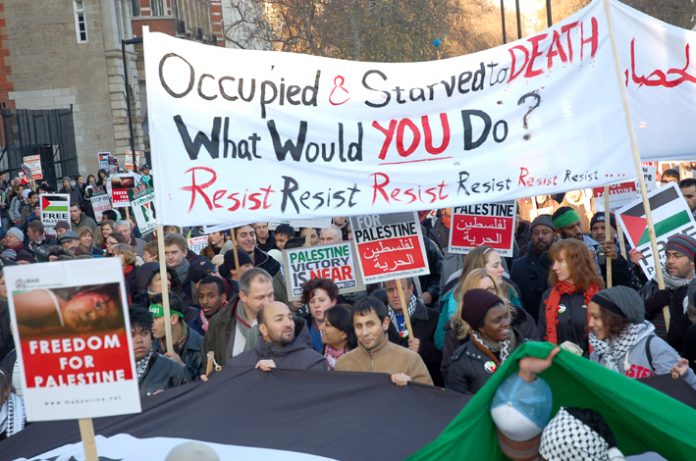Israel’s security cabinet warned on Wednesday that it will hold Hamas responsible for any attacks from Gaza, and it will also keep the crippling blockade of the Palestinian territory in place.
In the face of US pressure, Prime Minister Binyamin Netanyahu convened the cabinet to consider easing the stifling blockade that Israel slapped on Gaza two years ago.
‘The cabinet decided that Israel considers Hamas responsible for any attacks against Israel from Gaza’s territory,’ the Israeli premier’s office said afterwards.
‘The cabinet instructed the IDF (Israel Defence Forces) to respond to any attack against Israel from Gaza,’ it said.
As to the blockade, the statement said only that ‘the cabinet is examining further ways to ease the life of the Palestinian population in Gaza while keeping Israel’s security interests.’
Ministers also discussed Gilad Shalit, the Israeli soldier captured by the Gaza resistance, including fighters from Hamas, in a deadly cross-border raid in June 2006 and who remains in captivity.
‘The cabinet instructed the bodies dealing with the issue of Gilad Shalit to make every possible effort to bring about his release,’ it said.
Meanwhile on Wednesday, Israeli Defence Minister Ehud Barak urged Netanyahu to accept the notion of an independent Palestinian state.
‘The current government was formed with the commitment to respect the deals reached by preceding governments,’ Barak told Israel public radio.
The remarks come ahead of a much-hyped speech in which Netanyahu says he will lay down his policy on peace negotiations.
The speech will be delivered on Sunday.
According to Barak, Israel’s prior commitments include ‘the roadmap which clearly states that the conflict must be resolved on the principle of two states for two peoples.
‘If such a solution fails,’ said the former prime minister, ‘there will be only one political entity from the Jordan Valley to the Mediterranean – the state of Israel.
‘Under such a scenario,’ he continued, ‘if the Palestinians have the right to vote, it will no longer be a Jewish state, but a bi-national state. And if they don’t have the right to vote, it will be an apartheid regime.’
Asked in an interview with the newspaper Haaretz what he thought Netanyahu would say in his upcoming speech, Barak said, ‘I don’t know.
‘I have guesses, but nothing more.
‘The prime minister’s discussions are real discussions. This government will surprise people yet.’
Also in a statement issued on Wednesday, chief Palestinian negotiator Saeb Erekat weighed in on the same issue saying that Israel is obligated in its prior commitments to accept the two-state solution.
Meanwhile, the International Committee of the Red Cross said on Wednesday that Israel must end a two-year policy of denying family visits for Palestinian prisoners from Gaza.
Parents, spouses, siblings and children of about 900 detainees have been deprived of face-to-face contact since June 2007, when the Israeli government decided to suspend the ICRC-run family visit programme, according to the organisation.
‘Palestinian families must be allowed to visit their next of kin in Israeli prisons.
‘This is a humanitarian issue of utmost importance,’ said Pierre Wettach, the ICRC’s head of delegation in Israel and the occupied territories said in a statement.
The ICRC says the situation has been especially painful for the children, who have gone without precious contact with a parent.
‘On several occasions detainees or relatives of detainees have died without their family members having the opportunity to say their final farewells,’ the Red Cross said.
For more than four decades, the ICRC has been helping families from the occupied territories, including the West Bank, Gaza, East Jerusalem and the Golan, to maintain contact with their relatives held in Israeli prisons.
The families are still nurturing the hope that, some day, they will again be allowed to board ICRC buses taking them to those they have been longing to see for two years now.
Until then, communication between the families and the detainees is limited to written Red Cross messages and oral greetings collected when ICRC delegates visit detainees and passed on to the families in Gaza.
Since June 2007, more than 10,000 written messages and 400 oral greetings have been exchanged with the help of the ICRC.
l An Israeli military court sentenced Al-Aqsa Brigades leader Kamal Jamil Abu Shanab from Tulkarem to three life sentences to be served back-to-back, during his court hearing on Wednesday.
The 35-year-old Abu Shanab was detained during a March 3rd 2007 invasion of Ramallah.
The Brigades leader was in the Palestinian Authority military intelligence headquarters when he was seized.
Abu Shanab is detained at the Ashkelon prison.
l Clashes erupted on Wednesday as massive forces of Israeli soldiers and border police descended on Jerusalem’s Al-Bustan neighbourhood to serve nearly a hundred demolition notices to Palestinian homeowners.
The demolition orders were served to the owners of the 88 homes earlier threatened with destruction under Israeli law 212, which allows homes to be demolished or evacuated without any formal legal charges being brought forth or any party convicted of an alleged violation of the Israeli Planning and Building Law.
Erase
This law was also used in 1967 to erase the Palestinian Al-Mugharbi neighbourhood inside the Old City to form the plaza in front of the Western Wall, believed to be the site of the third temple in Judaism.
The neighbourhood was razed and is now an open compound for Jews to pray near the wall.
Residents clashed fiercely with police, who are said to have been forced to retreat to the entrance of the neighbourhood, a subsection of the Silwan area, which lies next to Jerusalem’s Old City.
